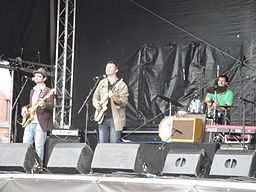Intelligence
One-Hit Wonder
A short-short story about a has-been, who feels his best days are behind him.
Posted June 22, 2017

Here is the latest of my short-short stories, an attempt to provide life lessons without the how-to article's pontification and aridity. This one (and the questions at the end) might be of particular interest to anyone who thinks their best days are behind them.
His life peaked when his bubble-gum song, Love is the Answer, climbed the charts, reaching number 4 in 1964. Lots of photo shoots, a tour, adoring fans, media interviews, including by one sycophant who couldn’t stop giggling. It was a crowning moment.
It was downhill from there. The sequel songs sounded the same and so never made it. So his gigs paid ever less, which meant he had to hire weaker back-up players, singers, and tech, which meant his shows got worse reviews. Unlike some stars, he didn’t spend more than he earned, indeed had a prudently invested nest egg but that too started to dissipate, so he moved to a more modest apartment and sold his Mercedes for an old Toyota.
When the gigs sunk to bars that mainly did karaoke, he needed to take a day job. The best he could get was car salesman. The sales manager only hired him because she knew that some customers would think it’s cool to buy a from a former rock star, even a one-hit wonder. But he was a musician, not a salesman, and hated having to “close ‘em and up-sell ‘em” so after his first three months, he had sold a total of six cars and at low profit and so was fired. Next stop, bartender, where, during breaks, he’d sing self-accompanied on the guitar. Not surprising, that environment and his fall led to his own drinking and smoking pot, ever more often.
One night, he got home from his job—It was 2:30 AM because the bar closed at 2—to hear a voicemail from that giggling reporter from long ago. She had heard that he had fallen on hard times and wondered if he’d be willing to be interviewed for an article—She was now working, or rather volunteering, for a music website. Although embarrassed at the thought of his descent being publicized, his hunger for a bit of the old acclaim prevailed.
She asked him, “Walk me through your life. Start with just the positive. What are your life’s most pleasurable moments? Start at the very beginning.”
I remember when I was five, seeing a sidewalk of light gray and then a block of it that was darker gray. I stepped on it and it made an imprint of my foot, and when I came back the next day, it was still there. I loved that.
I really loved my first slow dance. It was in the 5th grade in the basement of a friend’s house, and the record player—they had 45s back then—kept playing To Know Know Know You is to Love Love Love You, and I kept dancing with the same girl for what must have been an hour. It really did feel like heaven, like the song “Stairway to Heaven.” No, not the Led Zeppelin one, the Neil Sedaka one.
I remember when they gave me an IQ test. I was scared to death but when they called my mother in to tell the results, they said my intelligence was way above average. That did more to make me feel good about myself than anything, even Love is the Answer.
It also really felt good when they asked me to sing The Star Spangled Banner at junior high school graduation.
From high school on, of course, the big thing was having that hit, but it was like a coke high: awesome but short and the crash is hard and long.
The takeaway
What have been your best moments? Any way to amplify their effects now? Any way to duplicate some version now?
Have you been living on a past accomplishment and should look for a new goal?
Have you been rationalizing inaction, wishing it were the good old days?
If you consider yourself a has-been, should you aim high yet again? Or focus on acceptance and just appreciate smaller wins?
I read this aloud on YouTube.
61 of Dr. Nemko’s short-short stories are in his just-published book, Modern Fables. You can reach career and personal coach Marty Nemko at mnemko@comcast.net.


